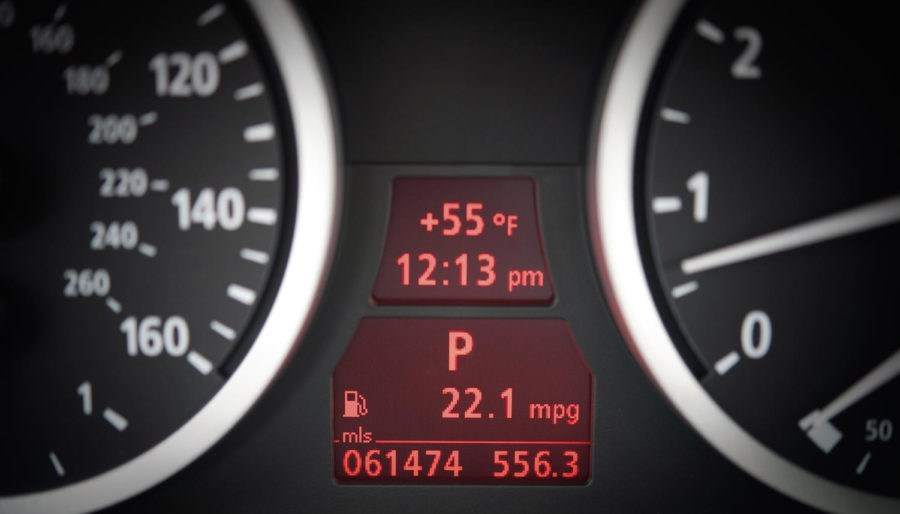Watson: On fuel economy, one party goes forward and the other drags behind
Car dashboard with tachometer, speedometer and gasoline gauges
September 7, 2012
The Obama administration finalized new fuel-efficiency standards last Tuesday, requiring auto-manufacturing companies to build cars capable of achieving an average efficiency rate of 54.5 mpg and emission expenditure of 163 grams of CO2 for trucks and cars alike by 2025. Currently, the Corporate Average Fuel Economy standards for all automobiles currently being manufactured are to have an average mpg of 29. An achievement of this goal would bring far-spreading, fantastic amounts of stupendous change, from reducing dependency on foreign fuels, to lowering emissions; all while saving you money at the pumps. An idealistic goal — absolutely. An achievable goal — I guess we’ll see.
Automakers are being asked to nearly double the fuel efficiency of autos in production today. Every year, the Environmental Protection Agency calculates average CO2 emissions and average mpg of American vehicles in production. In 2011, the EPA declared the automobiles of America to have a CO2 emission rate of 391 grams per mile, with an average of 22.8 mpg.
By 2016, auto manufacturers have the task of reaching the benchmark average of 35.5 miles per gallon in all currently manufactured vehicles on the American roadways. These expectations of increasing fuel efficiency may seem daunting, but the Obama administration and automakers alike are confident in their expectations of what is possible for efficiency and emissions standards.
Throughout lengthy negotiations spread over a couple years, 90 percent of automakers whose cars roam the roads of America, all agreed to the new standards.
The surge in demand for fuel efficient and low-emission autos of the last few years has been driven almost entirely by consumer demand. This fact largely explains such minor progress in improving efficiency over the last 30 years — with no incentive (aside from progress) to compete with other manufacturers, automakers have no reason to invest more money into research and development than what the consumers demand. For the first time since 1975, when the first (and only, until last Tuesday) mandatory efficiency standards were put in place, those standards are being updated, demanding more than a minimal effort from automakers to improve a few of the many issues revolving around the auto industry.
Experts predict if auto makers reach the goal set for 2025, greenhouse emissions will be cut in half. On top of that, savings on fuel will save Americans more than $8,000 per car in that period of time.
The new Corporate Average Fuel Economy standards are giving reason for environmentalists to celebrate and for conservatives to express concern. Mitt Romney and the Republican Party are quick to chastise the new standards, saying the purported $8,000 savings at the pump would be nullified by a drastic increase in car prices and taxes paid for the technology to create these efficient machines.
Both political parties are making attempts at doing what they feel is best for America; the difference is one party is marching onward to the tune of pro-action, and the other is dragging its feet in lieu of potentially detrimental change. This is a typical pattern for the American political system, but it’s a necessary one. Our population requires some of its members to think of possibilities to make the future better than the present, but we need some to think in terms of what is realistic.
However, these progressions are necessary to the evolution of the world as well as the auto industry. We need cars which produce fewer emissions and run more efficiently, if for no other reason than being the right thing to do. Every facet of the auto industry’s problems are still disputed by some — from the longevity of oil, to the effects on the environment — but that does not mean we should wait to do something about it until it is too late. If we have the means of reducing our carbon footprint and lowering dependency on foreign oils, why wouldn’t we?
It is utterly irresponsible not to tend to the problems of the auto industry because of disputable money issues.







